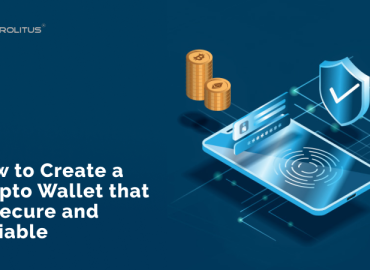Before planning to dive into the crypto space or deciding the currencies you will be investing in, you will need to set up a crypto wallet to help store digital assets. A cryptocurrency wallet is essentially a placeholder to organize your crypto portfolio. In simpler words, a crypto wallet interacts with a blockchain network.
A wallet contains a private key to secure digital assets that you need to keep safe with yourself. A crypto wallet allows the owner to quickly send and receive cryptocurrencies and other digital assets. A crypto wallet can be divided into software, hardware, and paper wallets. Even though there are some variations, the function is similar in keeping the digital assets safe.
Why are Cryptocurrency Wallets important?
As an example, a standard wallet is helpful in safely keeping cash and debit/credit cards. A crypto wallet is entirely different as it doesn’t store your assets. The digital assets are present on the blockchain that you can access using a private key.
It means that keys will prove your ownership of your digital money and allow you to make transactions, i.e., losing your keys will result in losing access to your assets. Also, it is advisable to keep a crypto wallet instead of storing directly on the exchange. You will retain ownership of your private keys and fully control your finances by keeping a wallet.
How do Cryptocurrency Wallets work?
Crypto wallets fall under two main categories: software and hardware wallets. Each kind of wallet helps store digital assets and differs in some functions. As we already discussed how wallets do not store assets, let’s look at how keys help access our cryptocurrencies.
A crypto wallet can generate mandatory information to send and receive cryptocurrency via blockchain transactions. The data consists of one or more pairs of public and private keys. The keys help generate an alphanumeric identifier known as a wallet address.
A wallet address is a specific “location” on the blockchain that guides you to send cryptos. Hence, you can share your wallet address with others to receive funds. As an extending benefit, a private key will provide access to your funds on any device, even if your smartphone or computer gets compromised.
Let us learn more about the two types of keys: public and private keys.
Public keys
A public key works similar to the standard bank account number and contains a long string of random numbers. We can share a public key with a third party without compromising the security of your wallet. It allows you to receive cryptocurrency in transactions using a wallet address.
Private keys
As the name suggests, private keys should be restricted to you and not shared with everyone. A private key allows you to access the cryptocurrency on the blockchain. A person can gain access to digital assets of your wallet if they gain access to your private keys.
Different types of Cryptocurrency Wallets
Crypto wallets are available in several options, of which the most famous examples of the different wallet types are:
- Hot wallet: Binance exchange.
- Mobile crypto wallets: Trust Wallet, MetaMask.
- Browser extension crypto wallets: MetaMask, Binance Chain Wallet.
- Desktop crypto wallets: Exodus, Electrum.
Hot wallets
A wallet connected to the Internet is known as a hot wallet. For example, if you create a crypto wallet on any cryptocurrency exchange or use any browser extension crypto wallet, it will count as a hot wallet. A hot wallet is quick to set up and allows seamless transfer of funds for traders.
Cold wallets
A wallet not connected to the Internet is known as a cold wallet. It is a physical wallet that stores keys offline to prevent online hacking attempts. A cold wallet is helpful for long-term investors as it provides a safer medium to store their digital assets.
Software wallets
A software wallet is a hot wallet (connected to the Internet) and is a broad class that contains many different types of wallets with unique characteristics. Web, Mobile, and Desktop are the most common software wallets available.
Web wallets
A web wallet allows you to access your digital assets through a browser interface. You do not have to install any wallet and can still access blockchains. Web wallets include both exchange wallets and other browser-based wallet providers. An exchange wallet generally holds your private keys as it may be more convenient for inexperienced users.
Desktop wallets
A desktop wallet is a software stored on your computer that allows access to your digital assets. It provides complete control over your keys as the wallet stores private key information on your computer. You can further use the file to access your cryptocurrency addresses.
Since the information is present on your desktop, you must keep a backup of your file or export the corresponding private key. It will help you gain access to your funds if your computer stops working.
Mobile wallets
A mobile wallet is designed for smartphone users to conveniently send and receive cryptocurrencies via QR codes. It helps perform daily transactions and payments in the real world. However, a mobile wallet is also prone to malicious actors, and it is essential to backup your private keys and encrypt your mobile wallet with a password.
Hardware wallets
A hardware wallet is a physical device that stores your digital assets. It uses a random number generator (RNG) to generate public and private keys. A hardware wallet is a cold wallet (not connected to the Internet) that stores keys in the device itself. It offers high security against attacks but, at the same time, lacks accessibility to use the wallet.
A hardware wallet is best for someone that plans to hold digital assets for a long time. Generally, HODLers use a hardware wallet as it allows you to set up a PIN code to protect your device.
Paper wallets
A paper wallet is essentially a paper that contains a crypto address and its private key in the form of QR codes for executing cryptocurrency transactions. A paper wallet is vulnerable to several flaws which have discouraged its use among the general public. A considerate drawback with paper wallets is that you cannot send partial funds but only the entire balance at once.
How to choose the best cryptocurrency wallet?
While a crypto wallet will depend on your requirements and level of expertise, below are some of the points that you can consider before choosing your crypto wallet.
- Security: Each crypto wallet offers a different level of protection to protect your digital assets. While a hardware wallet will provide greater security, a software wallet shall be more vulnerable to online attacks. Therefore, it is essential to carefully check different aspects before putting your trust—and money—into them.
- Fees: A crypto exchange wallet will charge you fewer fees for processing transactions, while a web browser-based wallet will charge you higher prices. It is essential to check on the required fees and the transactions you will be performing in the future.
- Cryptocurrencies: While a crypto wallet can not store a particular cryptocurrency, another wallet can hold the same asset. It is crucial to look for a crypto wallet that will help you swap different cryptocurrencies with ease.
- Customer support: It will be handy when you encounter any problem while using your crypto wallet. The companies that offer 24/7 support as part of their service will always have the edge over others that do not provide good support.
- Access: A mobile wallet will be handy to someone who regularly transfers cryptos, while a hardware wallet will benefit a long-term holder. Hence, it is essential to determine where and when you trade cryptocurrencies to choose the best wallet.
What are multi-signature wallets?
Multisig wallets require two or more private key signatures to authorize transactions. The wallets help prevent losing access to the entire wallet if one key is lost. A user can still access the wallet by other keys. A multi-signature wallet is helpful for corporations, hedge funds, and exchanges as they prevent misuse of funds. You can have a multisig wallet in any of the wallet types described above, i.e., hot wallets, cold wallets, hardware wallets, etc.
Final Thoughts
A crypto wallet is essentially a crypto bank account that allows you to store Bitcoin and other cryptocurrencies. They are essential to send and receive funds through blockchain networks. Also, it is vital to understand how they work before moving your funds, as each wallet type has its advantages and disadvantages.





